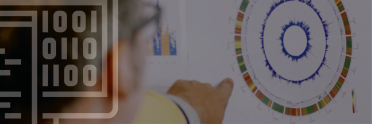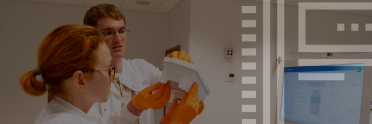Our strategy
Accelerating life science research and delivering global societal impact.
The Earlham Institute’s mission is to decode the scale and complexity of living systems so we can understand, benefit from, and protect life on Earth.
To achieve our mission, we have set out strategic research themes to accelerate life science research, deliver global societal impact, and put the Earlham Institute at the forefront of advancing knowledge in the era of data-intensive biological research.
These scientific themes will ensure we continue to:
Alongside the scientific themes sits a commitment to our people, recognising the importance of our community and workplace culture in achieving success.
We are bridging the gap between biology and computer sciences, ensuring we can overcome challenges of scale and sensitivity as the volume and complexity of data increases.
Through pioneering research projects, partnerships, training and community engagement, we will spearhead the use of genomics to advance bioscience research and innovation in the UK.

Our scientists are constantly creating, adapting, and perfecting in order to help maintain the pace of discovery, enabling researchers to answer questions in a range of scientific fields.
From new methodologies and bespoke approaches to the hardware and software needed to tackle intractable problems, Earlham scientists will innovate and collaborate to keep us at the cutting edge.

We are renowned for studying complex species, environments, and biological questions - revealing insights into the basic building blocks of life, the interaction of organisms and environments, and how we can harness this in the future.
We will help to shape the field of systems genomics while placing genes in the context of pathways and networks, helping us to understand how traits emerge from the complex interplay between genetic and non-genetic factors.

Pioneering research at the Earlham Institute is addressing the biggest challenges facing humanity, from climate change and food security to human health and wellbeing.
We will bring our unique blend of science, expertise and infrastructure to the table, working with national and international partners to deliver global impact.

Our success relies on each individual experiencing an environment where they feel able to meaningfully contribute and connect to their work, colleagues, and the wider mission of the Institute.
We are committed to building an organisational culture that is welcoming, respectful and inclusive, and where each person can access the training and support they need to reach their potential.

This strategy provides a focus for our efforts but is not designed to be all-encompassing, recognising the value of curiosity-driven science and the need to be agile so we can exploit new opportunities as they arise.
To support this, a range of business-critical activities will ensure the Earlham Institute delivers science leadership and impact. From our work with industry and portfolio of public engagement activity to training the next generation of scientists, this wider work will help to ensure we remain cutting-edge, relevant, and competitive in an ever-evolving research landscape.
The Earlham Institute’s mission is to decode the scale and complexity of living systems so we can understand, benefit from, and protect life on Earth.
Our success relies on each individual experiencing an environment where they feel able to meaningfully contribute and connect to their work, colleagues, and the wider mission of the Institute.
Our projects span the breadth of life sciences, as well as technology development, data infrastructure and knowledge exchange. We have a focus on genomics and bioinformatics, applied to plants, animals and microbes.
We work with organisations and partners to translate our knowledge and expertise, provide access to our technology platforms, and realise the impact of public investment in the Earlham Institute.
We are proud to attract talented scientists from all over the world, who bring with them vast experience in genomics, bioinformatics and scientific computing. Led by expert group leaders, our research groups are at the forefront in modern life sciences.